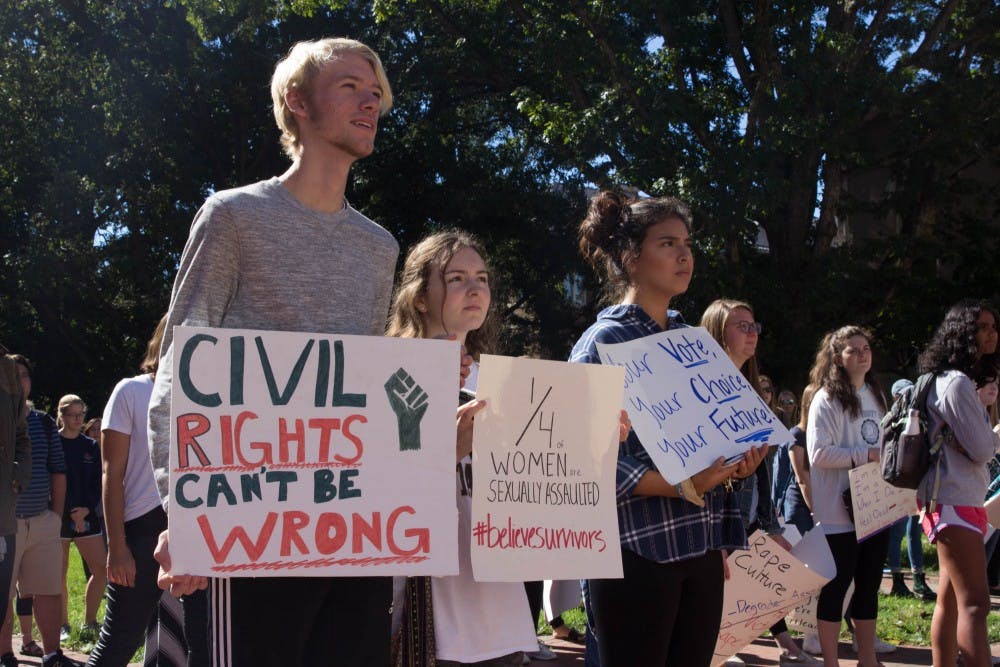“Later this year, the University will ask the U.S. Supreme Court to review the state court’s ruling that forced the University to release student records that could identify survivors and that could discourage students from participating in the University’s adjudication process,” Allison said.
Dialogue and policy changes
Going forward, students activists hope to see changes in policies surrounding sexual assault from the University.
“I just want there to be dialogue,” Jamison said. “And I hope that student organizations, like mine, are going to be able to facilitate that dialogue even in such a distanced time.”
Kayla Pope, a member of Coalition Against Violence at UNC, said she thinks the conversation needs to switch from "It’s on the survivors" to "It's on the University" to prove that something has come from the lawsuits and complaints.
“I think that the way that UNC handles its policy, it puts a lot of the burden on survivors, as their discourse does,” Pope said. “I've heard from a lot of survivors that when they reported, it felt like they were doing a lot of leg work, or like the University was protecting the perpetrator as much or more as they were protecting the survivor.”
Allison said the UNC EOC Office addresses reports in a way that seeks to empower survivors to maintain control over the University’s response to their reported experience. Allison said the University addresses reports without regard for the status or position of the person being reported.
“Our process includes both supportive resources for survivors and as required by federal guidance, an impartial and fair adjudication process that provides due process and equitable opportunities for all parties,” Allison said.
Activists also said the University must prioritize education to prevent sexual assault and gender-based violence.
“I think that we need to do a lot more effort on the front end when it comes to education,” Jamison said. “Because we’re not going to stop sexual assault by having a good Title IX process. If we are getting involved with Title IX, it's already too late.”
Anwar Boutayba, the communications director for Coalition Against Violence at UNC, said the online module about sexual assault that students are required to complete is not that effective, as students can easily click through it without paying attention.
“I think the whole violence prevention section of orientation should be active,” Boutayba said. “I know that's a very tall order in the era of COVID, but I'm obviously talking in the future. It should not be an online module.”
To get the day's news and headlines in your inbox each morning, sign up for our email newsletters.
Allison said the training moduel, Everfi, is an efficient way to share policy definitions, reporting options and places to find resources with the entire campus.
“We understand that effective prevention requires more,” Allison said.
Allison said UNC has dedicated resources toward prevention efforts with the Gender-Based Violence Prevention Advisory Group — a task force Boutayba is a part of.
This task force is dedicated towards programming and creating a framework for violence prevention on UNC’s campus, Boutayba said.
Going forward
Boutayba said the Coalition Against Violence at UNC has been garnering a bigger social media presence to raise awareness. He said he has drafted statements, as well as an infographic for the overall student body, concerning the release of the records.
“I think the main problem is that there is no follow-through,” Boutayba said. “Because the activism is there, the energy is there, the passion is there. Is the institutional support there? The answer is no — and I think that decision is inherently political.”
Pope emphasized the importance of recognizing survivors and student activists following the release of the records.
“I think it's really important for everyone, like the media and the University, to really emphasize that this was student- and survivor-led, that these complaints don’t really just drop out of nowhere," Pope said. "It's been a very long time coming for a lot of them and that recognition is always nice."
university@dailytarheel.com




